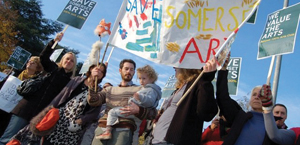Working together
Ralph Lister takes a look at the National Rural Touring Forum and its efforts to improve arts access in rural areas

There have been momentous changes in the arts in the past few months.
Nationally, both rural touring schemes and the National Rural Touring Forum (NRTF) have fared reasonably well. Most schemes, with one notable exception, have retained much of their local authority funding and also maintained their status within the ACE portfolio. In some cases the £40,000 minimum funding threshold laid down by ACE has resulted in an increase in funding to some organisations as well as to the NRTF itself. On the other hand, a number of artists and companies have been unsuccessful in their applications to be part of ACE’s National Portfolio from 2012 – including Forest Forge, Northumberland Theatre Company and Oxfordshire Touring Theatre Company. Shortly after the ACE announcements, Charlotte Jones, the Independent Theatre Council’s Chief Executive, expressed her concern about the future of rural touring and the reasoning behind an increase in funding for the NRTF.
As is often the case there is a story behind the story and nuances are missed as headlines are announced. Both the NRTF and the schemes fully appreciate that they represent one half of the equation; the presenting half. Without high quality work being made, rural-based audiences would be getting a raw deal. The uplift to the NRTF, modest as it is, could not be equated to the total loss suffered by companies working in rural areas. Our view is that the ‘operating context’ is getting tougher, and it is now incumbent on parties sitting on both sides of the equation to work together in terms of advocacy, and to make optimal use of the available resources to their mutual benefit and, ultimately, to the benefit of our audiences.
The recent Annual NRTF Conference, chaired by John McGrath, Artistic Director of the National Theatre of Wales, was an opportunity for those with an interest in rural touring to come together and to see ‘work’. We debated new ways of reaching new audiences in new places – pubs, village fetes, other outdoor spaces as well as improving our ‘reach’ to diverse audiences. We held the inaugural meeting of the International Village of Culture network with colleagues from Scotland, Wales, Canada and Sweden. We shared a lot with our compatriots who live and work in rural areas in other parts of the world.
Less disposable income means audiences may think twice about the kind of shows they want to attend and the price they are willing to pay. Less funding means that many venues will be squeezed financially and may become more cautious in programming terms – and may wish to revisit the terms under which they contract companies. More than ever, a productive dialogue between the producing and presenting sectors is absolutely critical. The papers commissioned by ACE prior to the portfolio review made this clear and the worsening economic situation emphasises this need.
The NRTF is planning a curated rural touring showcase conference for 2012. China Plate will be contracted to oversee a blend of work either as extracts, full shows or pitching sessions. This will provide an opportunity for all parties interested in rural touring to come together. The NRTF will also have a presence at the Edinburgh Fringe Festival for the first time, and we are pushing harder to involve volunteer promoters in all of these activities. We also wish to make stronger links with arts centres, particularly those located in rural areas, and are planning new initiatives that will enable us to do this.
It is worrying that local authorities have to cut budgets for the next two years and there are concerns about how further cuts might impact on the sector. Many schemes receive as much funding from local authorities as they do from ACE. With over 6,000 volunteers working with touring schemes, the sector embodies the ‘Big Society’ mantra (as with many areas of society it preceded the notion of the ‘Big Society’ by at least three decades).
With the rise in fuel prices making people think twice about car journeys and increasing concerns about climate change, we are looking at the issue of sustainability. The Night Out scheme in Wales has commissioned a piece of research by the University of Wales to look at the sustainability of rural touring from a social and economic as well as from an environmental point of view. It has not escaped our notice that there are advantages to bringing a single van with a group of performers to a village hall over 40 cars taking an audience to the nearest purpose-built theatre.
In spite of the challenges, for those of us who can find creative ways of working together there will always be opportunities. There is growing awareness and recognition of the value of rural touring, nationally and internationally. The NRTF and the schemes are keen to partner up with others to capitalise on this.
Join the Discussion
You must be logged in to post a comment.